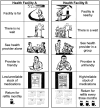Preferences for Hypertension Care in Malawi: A Discrete Choice Experiment Among People Living with Hypertension, With and Without HIV
- PMID: 39269593
- PMCID: PMC11739184
- DOI: 10.1007/s10461-024-04492-y
Preferences for Hypertension Care in Malawi: A Discrete Choice Experiment Among People Living with Hypertension, With and Without HIV
Abstract
Hypertension is the most common non-communicable disease diagnosed among people in sub-Saharan Africa. However, little is known about client preferences for hypertension care. We performed a discrete choice experiment in Malawi among people with hypertension, with and without HIV. Participants were asked to select between two care scenarios, each with six attributes: distance, waiting time, provider friendliness, individual or group care, antihypertensive medication supply, and antihypertensive medication dispensing frequency (three versus one month). Eight choice sets (each with two scenarios) were presented to each individual. Mixed effects logit models quantified preferences for each attribute. Estimated model coefficients were used to predict uptake of hypothetical models of care. Between July 2021 and April 2022 we enrolled 1003 adults from 14 facilities in Malawi; half were living with HIV and on ART for a median of 11 years. Median age of respondents was 57 years (IQR 49-63), 58.2% were female, and median duration on antihypertensive medications was 4 years (IQR 2-7). Participants strongly preferred seeing a provider alone versus in a group (OR 11.3, 95% CI 10.4-12.3), with stronger preference for individual care among those with HIV (OR 15.4 versus 8.6, p < 0.001). Three-month versus monthly dispensing was also strongly preferred (OR 4.2; 95% CI 3.9-4.5). 72% of respondents would choose group care if all other facility attributes were favorable, although PLHIV were less likely to make this trade-off (66% versus 77%). These findings have implications for the scale-up of hypertension care in Malawi and similar settings.
Keywords: Client-centered care; Discrete choice experiment; HIV; Hypertension.
© 2024. The Author(s).
Conflict of interest statement
Declarations. Conflict of interest: None of the authors have competing interests.
Figures
References
-
- Bloomfield GS, Khazanie P, Morris A, et al. HIV and noncommunicable cardiovascular and pulmonary diseases in low- and middle-income countries in the ART era: what we know and best directions for future research. J Acquir Immune Defic Syndr. 2014;67(1):Suppl 1(0 1)-53. 10.1097/QAI.0000000000000257. - PMC - PubMed
-
- Goldstein D, Salvatore M, Ferris R, Phelps BR, Minior T. Integrating global HIV services with primary health care: a key step in sustainable HIV epidemic control. Lancet Glob Health. 2023;11(7):e1120-4. - PubMed
-
- Department of Health Republic of South Africa. Available at https://www.health.gov.za/ccmdd/. Accessed February 17, 2024.
MeSH terms
Substances
Grants and funding
LinkOut - more resources
Full Text Sources
Medical
Miscellaneous




